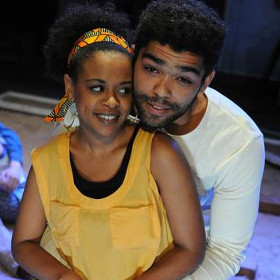We Are Proud to Present… (Bush Theatre)
Our reviewer shares his notes on Jackie Sibblies Drury’s politically-charged exploration of the first genocide of the 20th Century

© Alastair Muir
I needed a drink after this. I needed a drink because this play is provocative and confusing and restless. It is lecture, power-point, rehearsal, performance and process. It is a group of actors playing a group of actors attempting to tell the story of the German genocide of the Herero tribe of former South West Africa. Befitting the play’s hectic composition, below are the hurried notes I took post-curtain. For why shouldn’t criticism mirror the disorder of drama?
An attempt – ambitious, admirable, intelligent – to report a neglected genocide, and to reflect on the legacy of said genocide (these things tend to resound, to take new shapes). The play is formed of cracks and holes and flaws and over-laps and cover-ups, and as such resembles HISTORY and LIFE.
The play within a play (device) exposes the ethical booby traps that come with attempts to (re)present HISTORY; and allows meta-fictional fun-poking at expense of theatre making. Example: Actor 5 doesn’t know what her ‘active verb’ is, and Actor 2 boasts of knowing several regional German accents, and of having gotten laid in that country, irrespective of region, with uncommon frequency.
The conflict between seriousness (subject matter) and silliness (egoistic thespians) reduces the weight and gravitas of the whole. Might the play have packed greater punch (hate that phrase) had the writer (Jackie Sibblies Drury) looked more squarely at the genocide and its contemporary resonance, without the backstage antics? (I don’t know).
White Man (Joseph Arkley) shows arrogance and fragility with delicate shifts of gesture and inflection. White Woman, keen to play the recipient of German love-letters, says: ‘I am Sarah.’ On paper a dead line, but Kirsty Oswald makes a beautiful meal of it, wresting from its seeming innocuousness a means of developing her character. Accent shifts – Irish, Deep-South, African, German – show verbal dexterity of cast AND suggest the changeability of the aggressor/victim relation.
Direction (Gbolahan Obisesan): deft comic touches add levity without impeding mood or rhythm. Example: when Herero tribesman is interviewed by TV crew about his cow, the boom (fluffy sound thing) is lowered in front of the lens by incompetent intern. Such touches lend something (a nice something) to the completed texture.
BUT the final scene/sequence, with the protracted clear-up of meaningful props by Another Black Man (after scary improvised lynching), did not resound or emote as was hoped. Why? Because I had started, thirty minutes earlier, to watch in a different way, in an indifferent way. Such a shift occurs when one senses that the dramatic event before them isn’t what it could have been.
The play asks: what limits compassion? Is to be black to be African? Can one act of genocide be more significant than another? Can history ever be justly set-down? Can the theatre return what has been erased? I asked a black guy eating free cheese whether it was easier for me to disengage emotionally because I was white, and whether we are duty-bound to KNOW our lineage and to CARRY it as a part of us, as a damn albatross? (He answered by fetching me another glass of wine).
We Are Proud to Present a Presentation About the Herero of Namibia, Formerly Known as Southwest Africa, From the German Sudwestafrika, Between the Years 1884 – 1915 continues at the Bush Theatre until 12 April












